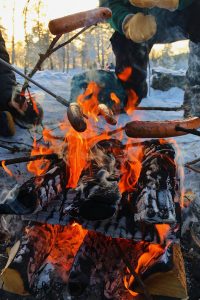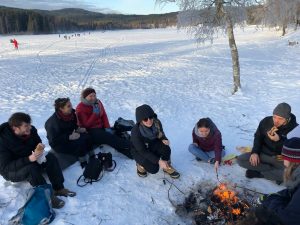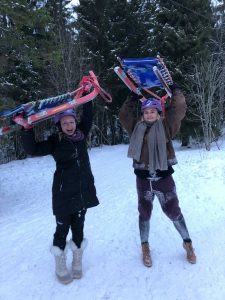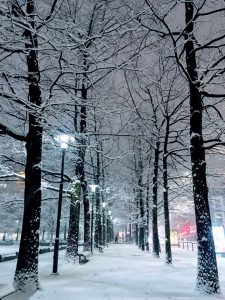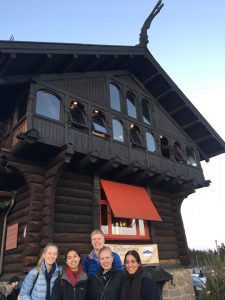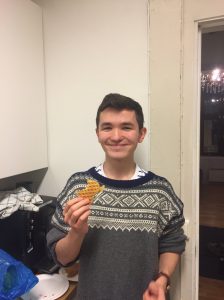When I became department chair three and a half years ago, I spent significant time reflecting on areas our department had not yet fully explored or developed. I also spent time examining how we might align these to St. Olaf College’s Strategic Plan, specifically in relation to Goal I: Enhance student participation in, and experience of, high-impact educational practices (HILP). Fast forward to today: thirteen students are just finishing up an exciting new course this January which I have been developing for over the last three years. And, it will be offered next year as well!
The course is NOR 296: Oslo Internship Reflection Seminar. It combines an academic internship in a humanitarian, religious or non-profit organization and a reflection seminar based in Oslo, Norway. The prerequisite is completion of the FOL in Norwegian (3 semesters) which is meant to provide novice level linguistic and cultural knowledge. This course specifically investigates one aspect of Norwegian culture that contrasts starkly from Norwegian-American culture, namely the workplace and its role in the welfare state. Norway is often referred to as a humanitarian superpower, and the host organizations represent pillars of the Norwegian welfare state. These organizations are exceptional examples of how the government supports and serves individuals inside and outside of Norway’s borders. The topics covered in the required prerequisite courses, taken together, adequately prepare students for a first-hand exploration of the Norwegian non-profit sector and daily life in Norway. Over the course of the month of January, students are developing LinkedIn profiles, reading three books tied to career and life after St. Olaf, discussing of course readings and cultural differences to get them thinking about how to connect their studies to their life after St. Olaf.
The Norwegian Department’s most significant challenge as a small program is to balance the needs of Norwegian majors and Nordic Studies concentrators. Some students need course options to deepen their linguistic and cultural competency in Norway while others need an equally stimulating experience while focusing on content from another field in English. Some of the course content mixes these two groups together, some is separated so that the Norwegian majors/ Nordic Studies students are able to further develop their Norwegian language proficiency. All students on this year’s program have been using Norwegian. Some are using solely Norwegian in their internships, some are using it for some tasks but not others, while others have an English speaking mentor so are using it less in their internships and more in town or with their fellow students. We have had some meals with divided English and Norwegian tables so that those who are here to further develop their Norwegian have that opportunity as well. I have also encouraged students to do as much of their coursework in Norwegian as they are comfortable, which many are doing.
In addition to the language, I’ve also challenged students to consider finding small ways to live a little more like a Norwegian this month. They’ve each been given a kaffekort (coffee card) to get out of their apartments and experience Norwegian coffee culture at coffee shops, to take a teaspoon of tran (cod liver oil) each morning with breakfast, and to consider sleeping with the heat turned off and the window cracked open. Students also swam in the icy Oslo fjord, have had a few waffle nights, sledded down the 1952 bobsled track, roasted hot dogs over a winter bonfire, went to the (nynorsk!) theater, a Norwegian film and to the opera!
Both study abroad and Internship reflection seminars are HILP that integrate studying abroad and real-life experiences in powerful and meaningful ways. Internships also challenge students to take an active role in determining both their short-term and long-term career goals. To give you a better picture of what these students are studying and where their internship is, see this second post.
The day before students began their internships, we reserved a floating sauna on the Oslo fjord for a relaxing afternoon. This was both meant to be something exotic and fun, but it was also meant to be symbolic. The idea being that sometimes you just have to trust yourself and jump in to new experiences without knowing exactly how or what direction they are going to go. I decided that I had to walk the talk and was the first to climb to the roof and jump in the icy water. What an invigorating experience and a great example of a point that was so much more fun to discuss outside of the classroom.
Our short-term plan is to offer this course again next year. My grant application for the Academic Innovation grant funds my FTE for two years. Then, the long-term aim is to be able to offer this course every other year. But, to make that a reality, we are dependent on additional, dedicated funding. There is some funding available for students to apply for through the Piper Center and also some because this is a study abroad program, but, not enough. This year there were a handful of qualified students who started the application process for the program, but who could not follow through because there was no guarantee of funding. They would have had to commit to the program before they knew how much funding they would get. This was understandably too risky for some students, especially given that Norway is an incredibly expensive country. My ultimate goal for the program is to find a donor who sees the value of the experiences this program offers and who would like to support this program, both in terms of supporting student expenses connected to housing and living expenses, and also for FTE to continue being able to offer this course.
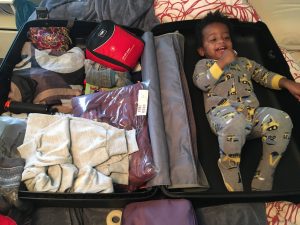 I would like to give special thanks to Bill Sonnega & Cindy Book, colleagues at St. Olaf, who have provided extensive feedback to the development of this course and who have given their permission to the use of parts of their on-campus internship reflection seminar syllabi for the development of this experience. And thanks also to Ben and my mom for taking charge of all the parental duties while I was away, since Simon wouldn’t fit in my suitcase!
I would like to give special thanks to Bill Sonnega & Cindy Book, colleagues at St. Olaf, who have provided extensive feedback to the development of this course and who have given their permission to the use of parts of their on-campus internship reflection seminar syllabi for the development of this experience. And thanks also to Ben and my mom for taking charge of all the parental duties while I was away, since Simon wouldn’t fit in my suitcase!
